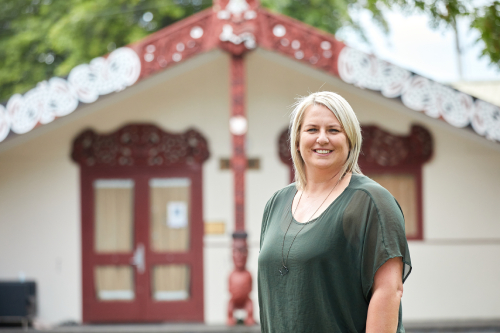Source: University of Waikato
Supporting people to be inspiring, authentic and innovative leaders in education the world over has been a life-long pursuit for Dr Rachel McNae. For over 20 years, Dr McNae has been passionately focused on the issues of social justice and innovative leadership development to create meaningful leadership curricula in schools and communities.
Her work has made an impact on the international stage; Dr McNae has created partnerships between the University and the Vanuatu Ministry of Education, led the New Zealand Educational Administration and Leadership Society as their National President, won national and international research awards, and been recognised for her research and contributions to the group of scholars – International Women Leading Education.
This solid grounding and award-winning expertise placed her in perfect stead to win a national grant working with Waikato-Tainui and the Ministry of Education in 2019 on her latest project which explores Leadership of Local Curriculum. The project will pave the way to better understanding of culturally aligned leadership and relationship building amongst schools, iwi and communities as they design local curriculum.
“Our proposal was successful because of our desire to work in partnership with iwi and engage a strength-based approach to leadership formation. The ideas which underpinned the design and kaupapa of the work came from deep and rich discussions with Waikato-Tainui education specialists and representatives,” says Dr McNae.
The team wanted to demonstrate how leadership could be conceptualised differently in schools, kura and early years centres, through positioning leadership as a distributed phenomenon – as opposed to something hierarchical, which has traditionally been the case in education and learning institutions here and abroad. Globally, leadership in education has traditionally operated in hierarchical silos – the learner and the teacher – but Dr McNae wants to continue reshaping the way education happens and leadership manifests.
“Leadership is often perceived through positions, systems and structures – positional in nature and something that sits within a hierarchy, often obtained through rites of passage. We need to bring the ‘humanness’ of leadership back by understanding the nature of one’s identity and our interactions with others, our respective personal narratives, our whakapapa,” she says.
The project – which is coming to completion at the end of the month – has seen Dr McNae, Te Puna Rangihau o te Whiringa Centre for Educational Leadership, Te Whai Toi Tangata Institute of Professional Learning and Waikato-Tainui work with over 50 leaders in the Waikato region. The project supported educational leaders to surface and enhance their professional leadership, while exploring what supported leaders of local curriculum to lead in culturally aligned ways.
The team have been discovering and documenting new ways of supporting leaders throughout the Waikato and highlighting what schools can do to build respectful, strong and sustainable partnerships with students, families, iwi and their communities. Dr McNae explains this “hasn’t been easy for school leaders to access knowledge of local context in order to build relationships with their iwi.”
“As a result, these relationships haven’t been as strong as they would have liked,” she says.
A variety of approaches to their research were positioned to be creative and adaptive allowing leaders to be supported individually, in small groups and as a whole. The key focus was about always coming back to what matters, “knowing our values and establishing and sustaining relationships.” This is something Dr McNae confirms in the ‘busyness’ of education, are areas which are often overlooked when, in fact, they are central to effective leadership.
In addition, the team applied leadership theory to make sense of big leadership ideas through each leader’s real-life experiences. Embracing leadership as a contextual and embodied practice highlighted there was no ‘one-size-fits-all’ magic approach to leading in culturally aligned ways. The centrality of leadership practices which prioritise relationships and cherish contextual and cultural knowledge was of huge importance to support, inform, and in some cases transform future generations of leaders in education, both here and overseas.



